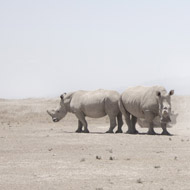
Dvur Kralove Zoo is home to 21 black and southern white rhinos
A zoo in Czechia has said that it will remove the horns from its herd of rare rhinos following a brutal poaching attack in France.
Speaking to The Guardian, a spokeswoman for the Dvur Kralove Zoo said: “It’s for the sake of rhino safety. The attack (in France) put us on alert, the danger is really intense.”
On 7 March 2017, keepers found four-year-old Vince dead in his enclosure at Thoiry Zoo, Paris. The rhinoceros was shot three times in the head by poachers, who stole its horn using a chainsaw.
The Dvur Kralove Zoo is currently home to a herd of 21 black and southern white rhinos. It told the Guardian that vets will put the rhinos under anaesthesia before removing their horns with a chainsaw and filing the sharp edges.
“We have never done this because of poachers. We did it for other reasons like transport or health concerns,” she added.
According to the WWF, hundred of white rhino have been killed annually in recent years. The species is particularly vulnerable because it is relatively unaggressive.
Rhino horn can sell up to $60,000 per kilo - more than gold or cocaine - with most demand from China and Vietnam. In traditional Asian medicine, powdered horn is used as a supposed cure for a range of illnesses.
Dvur Kralove is the only zoo in the world to have succeeded in the captive breeding of this extremely rare species.
In 2009, it placed three northern white rhinos in the Ol Pejeta reserve in Kenya.



 The Veterinary Medicines Directorate (VMD) is inviting applications from veterinary students to attend a one-week extramural studies (EMS) placement in July 2026.
The Veterinary Medicines Directorate (VMD) is inviting applications from veterinary students to attend a one-week extramural studies (EMS) placement in July 2026.